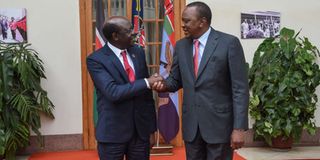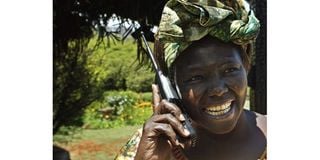Premium
Mukhisa who? Like Wangari before him, Kituyi may remain unsung hero at home

President Uhuru Kenyatta (right) and Dr Mukhisa Kituyi at State House, Nairobi in 2016.
What you need to know:
- Dr Kituyi is clearly way above average in intellect and eloquence.
- He is the first Kenyan to have climbed that high in the international arena.
In the same month Kenyan heroine and Nobel laureate Wangari Mathai has been shortlisted for the honours of having the longest tunnel in Belgium capital Brussels named after her, another illustrious Kenyan, Dr Mukhisa Kituyi, is returning home after a sterling career as the Secretary-General of the United Nations Conference on Trade and Development (UNCTAD) in Geneva.
Dr Kituyi is clearly way above average in intellect and eloquence. He knows how to package his facts and figures to make a convincing argument. I watched him address a closing rally for Mwai Kibaki’s re-election campaign at Nyayo Stadium in 2007. He is the only person who had President Kibaki grinning and nodding in agreement.

Nobel laureate Wangari Mathai.
That is quite something, given that Mr Kibaki isn’t quite given to compliments. At Kibaki’s farewell in 2013, Senator James Orengo, who served in his Cabinet, disclosed that, when addressing the retired President, he was always careful because the latter is ordinarily expressionless when one is talking to him and perhaps thinking what he is being told is mavi ya kuku (chicken droppings).
I also remember Dr Kituyi making a very reasonable presentation on why small-scale farmers in western Kenya should abandon sugar-cane farming and go for high value horticulture crops. I asked a friend from his constituency why they should reject such a brilliant man at the ballot. He dismissively replied: Wachana na huyo jamaa wa kizungu mingi! (Leave alone that man and his too-much English!)
That is the unfortunate fact about Kenyan politics. It is much easier for a scoundrel and war monger to strike a chord with the electorate and not a globe-trotting achiever. So with all due respect to Dr Kituyi, I wouldn’t be surprised if he gets less votes that his MCA in Kimilili should he vie for the presidency. Nothing personal, there are precedents to it.
First, the lady of trees. Prof Wangari Mathai’s achievements need no elaboration. She is the only Kenyan and one of the few Africans to have been honoured with a Nobel prize. Her great works in the field of conservation and in the academia could form a chapter in the book of legends.
Second liberation
In the early 1990s, she singlehandedly stood up to the authoritarian Kanu government and stopped it from desecrating Uhuru Park by building a skyscraper inside it. She also scuttled plans to convert Jeevanjee Gardens into a car park.

President Uhuru Kenyatta (right) and Dr Mukhisa Kituyi at State House, Nairobi in 2016.
Come the struggle for the second liberation and she was at the forefront. She is remembered for a famous sit-in by mothers of political prisoners that gave birth to what is today Freedom Corner inside Uhuru Park.
With all those credentials in her handbag, in 1997, Prof Mathai contested the presidency on some outfit called Labour Party of Kenya.
She had a fantastic manifesto that promised to make Kenya green this and that. But she could as well have been talking to trees. Nobody paid attention. I remember President Moi mocking her as he laughed loudly when addressing a campaign rally in Nakuru: Hata yule mwanamke wa miti nasikia anataka hii kiti! (Even that woman of trees wants this seat) he sarcastically remarked.
When the votes were counted, Prof Mathai had 4,139 votes or 0.07 of the total votes cast, and far less than votes garnered by a councillor in her rural Tetu home.
Then came Koigi for president. That takes me back to a week I spent in Belgium’s capital Brussels in December 2001. I remember travelling in a train through the tunnel proposed to be named after that great daughter of Kenya, Prof Maathai. It is a magnificent piece of technology that cuts across Brussels.
I was in the European capital for an award-giving ceremony jointly organised by the European Union and the International Federation of Journalists (IFJ). Yours truly – but do I say – was overall winner in the investigative journalism in the developing world category. Inside the hall at the EU headquarters, every other journalist wanted to chat with me in that short moment of fame. One of them was a journalist from Norway who had previously been to Kenya to cover trumped-up treason trial of politician Koigi wa Wamwere.
There was to be an election in 2002 and I remember the journalist telling me with all conviction that Mr Wamwere would be the next president of Kenya. “I am sure this time round Kenyans will vote him president now that dictator Moi isn’t a candidate,” he said.
I told him Mr Wamwere hadn’t declared interest yet, but doubted he would make much impact going by his performance in the 1997 election, when he polled a paltry 7,463 votes or 0.12 per cent of the total votes’ cast.
“But everybody knows Mr Wamwere was rigged out in 1997,” the journalist insisted. I had to quickly find another topic to deflect the know-it-all fellah from that discussion, lest he annoyed me with his ignorance of matters Kenyan.
It is the condescending know-it-all attitude one finds in foreign journalists even when they have landed in Africa for the first time that very morning!
But I knew where the journalist was coming from. In the late 1980s, Mr Wamwere used to make international headlines while in self-exile in Norway. Actually, at one point he was one of the best-known Kenyans in western capitals after President Moi, hence the view he would succeed Moi.
Well, like in the case of John the Baptist in the Good Book, in Kenya a prophet is big abroad but politically beheaded back at home.





